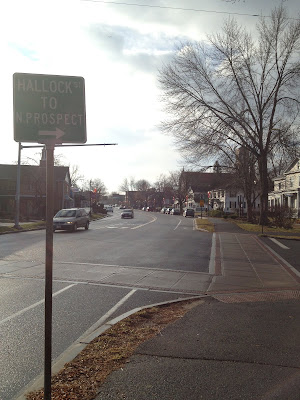Amherst Bulletin: above the fold, front page headline
Journalism and justice share a common goal: both seek "to tell the truth, the whole truth and nothing but the truth." And oftentimes it's not pretty. Or as jaded cops would say, "It is what it is."
Today's weekly Amherst Bulletin is an embarrassment to anyone who holds high that sacred tenet of journalism still taught in J-schools (I know because I was just in a classroom two days ago) to seek the truth and report it.
On Friday November 29, the Daily Hampshire Gazette belatedly reported the November 19th death of 19-year-old UMass student Sydne Jacoby from injuries sustained in a fall on Fearing Street the late night of November 16, after becoming sick from, according to a best friend's Facebook post, "a high level of intoxication." The next day that Gazette story is sent out over the
Associated Press national wire.
Well they sort of reported it, leaving out her name -- the very first W in the oldest journalism formula in the sacred reporter's notebook:
Who,
What,
When,
Where,
Why and How.
And now that I'm thinking about it, they also obscured the "How".
On Thursday November 28 -- a day before the Gazette story -- the
LI Herald published a prominent article about the sad untimely death of Ms Jacoby, publishing her full name, but leaving out the detail about alcohol.
On December 2 my story
is published, and the following day the Massachusetts Daily Collegian follows up with a banner
front page headline containing her name, and briefly mentioning the alcohol connection -- but only using the attribution of AFD Chief Tim Nelson from the Gazette article (where he had been specifically assured the young woman's name would
not appear).
But today's Amherst Bulletin story, buried on page 5, is unchanged from last week's original Gazette article. And the reason for leaving out her name is still the same excuse that UMass spokesperson Ed Blaguszewski refused to release her name. Even though her name had appeared in a variety of
published sources.
The front page, impossible-to-miss lead Bulletin story is, however, a direct byproduct of the this exceedingly sad episode: "More College
Women Treated For Drunkenness." Amazingly they fail to connect the dots to this most blatant deadly example from just two weeks ago.
Yes, the family did not want her name released -- but then, no family ever wants anything remotely negative to be associated with a deceased loved one. If we start allowing a family to edit a story then we are no longer reporters, we are PR flacks.
Ten years ago a horrific fire at the Station Nightclub in Rhode Island claimed 100 lives, the 4th worst fire catastrophe in our nation's history. What if
every relative told the media not to release the name of their loved one, or the fact they died in a bar?
What if we had 100 different media outlets simply reporting one local person died recently, but left out their name and the fact they died alongside 99 other people in a bar with substandard safety protocols?
As a direct result of that devastating fire (and the resulting avalanche of
news publicity), Massachusetts passed
safety legislation requiring sprinklers and "crowd managers" in bars with a capacity of 100 or more.
By shining a bright light on unsafe conditions -- especially ones that have led to a tragic outcome -- public officials are far more likely to actually do something about it.
We need to get a handle on the abuse of alcohol in our quaint little college town. Now!

































